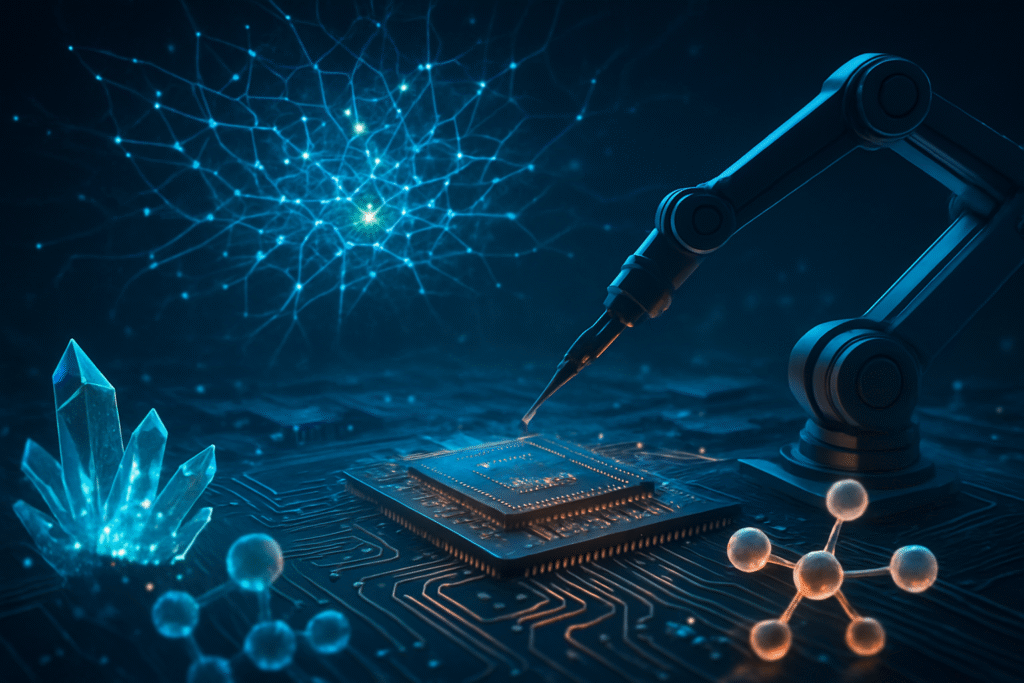
Artificial intelligence (AI) is orchestrating a profound transformation across the semiconductor manufacturing and advanced materials sectors, heralding a new epoch for the digital age. This symbiotic relationship, where AI not only demands increasingly powerful chips but also revolutionizes their creation and the discovery of novel materials, is positioning AI as a foundational technology for future technological progress. The integration of AI is not merely an incremental improvement; it's a fundamental paradigm shift essential for fueling the innovations that underpin our increasingly interconnected and AI-driven world.
The immediate significance of AI's pervasive influence is multifold. In semiconductor manufacturing, AI is driving what industry experts are calling a "silicon supercycle," redefining how chips are designed, produced, and utilized. The escalating global demand for high-performance chips—fueled by generative AI, autonomous systems, edge computing, and the Internet of Things (IoT)—necessitates faster, smaller, and more energy-efficient processors. AI is critical in meeting these demands by accelerating innovation cycles and optimizing complex manufacturing processes that traditional methods can no longer sustain. Simultaneously, in advanced materials science, AI is overcoming the historically time-consuming and costly trial-and-error methods of material discovery and design. It enables researchers to rapidly explore vast datasets, identify patterns, and simulate new materials with specific, desired properties at an unprecedented pace, vital for addressing global challenges from energy to healthcare.
AI's Technical Prowess: Reshaping the Core of Hardware Innovation
The technical advancements propelled by AI in semiconductor manufacturing are nothing short of revolutionary, fundamentally altering every stage from design to quality control. AI-driven Electronic Design Automation (EDA) tools, for instance, are automating complex and repetitive tasks like layout generation, logic synthesis, and verification with unprecedented efficiency. Machine learning algorithms embedded within these tools can predict chip performance, identify bottlenecks, and optimize power, performance, and area (PPA) much faster and more accurately than traditional simulation methods. This allows engineers to explore a far wider range of design options and accelerate time-to-market, significantly compressing development cycles for next-generation chips.
Beyond design, AI's impact extends deeply into the manufacturing floor. AI-driven systems monitor processes in real-time, leveraging sophisticated data analysis and pattern recognition to detect anomalies and predict potential defects before they occur. This enhances precision automation, where AI-powered visual inspection systems now routinely outperform human inspectors in accuracy and consistency, drastically reducing waste and maximizing manufacturing yield. Predictive maintenance, enabled by AI analyzing sensor data from machinery, forecasts equipment failures with high precision, minimizing costly downtime and ensuring continuous operation—a critical factor in capital-intensive semiconductor fabs. This contrasts sharply with previous reactive or scheduled maintenance approaches, which often led to unexpected stoppages or unnecessary service.
In advanced materials, AI's technical capabilities are equally transformative. Generative AI models can now hypothesize novel material structures and combinations, rapidly screen thousands of candidates, and predict their properties with remarkable accuracy before any physical synthesis. This "materials informatics" approach, powered by machine learning and deep learning, significantly speeds up the identification of promising materials for specific applications. Unlike traditional methods that relied on painstaking empirical experimentation, AI can navigate vast chemical and structural spaces, identifying non-obvious correlations and optimal compositions. For example, AI is facilitating the adoption of new materials, such as Molybdenum (Mo), which offers significantly lower resistance in nanoscale interconnects, leading to faster, more efficient chips—a discovery process that would have taken years, if not decades, using conventional techniques. Initial reactions from the AI research community and industry experts highlight the shift from a data-sparse, intuition-driven materials science to a data-rich, AI-accelerated discipline, promising a new era of material discovery.
Corporate Beneficiaries and Competitive Realignment in the AI Hardware Race
The transformative impact of AI on semiconductor manufacturing and advanced materials is creating clear winners and losers, reshaping the competitive landscape for major tech giants, specialized AI labs, and nimble startups. Companies at the forefront of AI-driven EDA and manufacturing stand to gain immensely. Chip design software providers like Synopsys (NASDAQ: SNPS) and Cadence Design Systems (NASDAQ: CDNS) are heavily investing in AI integration, offering tools that leverage machine learning to optimize chip layouts, verify designs, and accelerate development cycles. Their early adoption and continuous innovation in AI-powered design flows give them a significant competitive advantage, making their platforms indispensable for chipmakers navigating increasing design complexity.
Semiconductor manufacturing giants, particularly foundry leaders like Taiwan Semiconductor Manufacturing Company (NYSE: TSM) and Samsung Electronics (KRX: 005930), are leveraging AI to optimize their highly complex and capital-intensive fabrication processes. AI-driven predictive maintenance, yield optimization, and real-time process control are directly translating into improved efficiency, reduced waste, and higher throughput. These operational efficiencies are crucial for maintaining their leading positions in a market characterized by razor-thin margins and intense competition. Furthermore, companies developing advanced materials for next-generation chips and sustainable technologies, such as those focusing on novel battery materials or high-performance composites, are seeing accelerated development cycles thanks to AI, enabling them to bring innovative products to market faster.
The competitive implications extend to major AI labs and tech giants like NVIDIA (NASDAQ: NVDA), Intel (NASDAQ: INTC), and Google (NASDAQ: GOOGL), which are not only developing AI hardware but also investing in AI for hardware development. NVIDIA, for instance, uses AI to design its own GPUs and is a major proponent of accelerated computing for materials science research. Intel is integrating AI into its manufacturing processes to enhance its foundry capabilities. This internal adoption of AI for hardware development creates a virtuous cycle, where better AI helps build better chips, which in turn run AI more efficiently. Startups specializing in AI-powered materials discovery or novel manufacturing optimization algorithms are also emerging as potential disruptors, offering bespoke solutions that can significantly reduce R&D costs and time for their clients, potentially challenging established players with more agile, AI-first approaches.
Broader Significance: Fueling the Future, Addressing Challenges
The integration of AI into semiconductor manufacturing and advanced materials marks a critical juncture in the broader AI landscape, signifying a shift from purely software-centric AI advancements to a hardware-software co-evolution. This development is not merely about making existing processes incrementally better; it's about unlocking entirely new possibilities for what AI can achieve by providing the underlying physical infrastructure. The ability to rapidly design more powerful, energy-efficient chips and discover novel materials with tailored properties directly fuels the next generation of AI applications, from ubiquitous edge AI devices to more powerful data centers supporting massive generative AI models. It addresses a fundamental bottleneck: the physical limitations of current hardware in meeting the insatiable computational demands of advanced AI.
The impacts are far-reaching. Economically, AI's role in accelerating chip development and material discovery can stimulate significant growth, creating new industries and high-value jobs. Geopolitically, countries and regions that master AI-driven hardware innovation will gain a strategic advantage in the global tech race. However, potential concerns also arise, including the increasing complexity of AI systems in design and manufacturing, which could create new vulnerabilities or require specialized expertise that is in short supply. Ethical considerations regarding the environmental impact of increased chip production, even with AI-driven efficiencies, also remain a critical area for scrutiny. This milestone can be compared to the advent of automated design tools in the early days of microelectronics, but with AI, the level of autonomy and predictive power is exponentially greater, promising a far more profound and rapid transformation.
Furthermore, the precision and speed offered by AI in materials science are critical for addressing global challenges. AI is unlocking the advanced materials required for next-generation green technologies, such as more efficient solar cells, higher-capacity batteries (by assisting in the discovery of better electrolytes), and critical carbon capture technologies, accelerating the path to carbon neutrality. It also aids in developing new materials for aerospace, defense, and medical applications like biocompatible implants, which are essential for human progress. The ability of AI to optimize raw material usage and minimize waste during production also contributes to more sustainable manufacturing practices, aligning technological advancement with environmental responsibility.
The Horizon: Near-Term Innovations and Long-Term Visions
Looking ahead, the trajectory of AI in semiconductor manufacturing and advanced materials promises a cascade of near-term and long-term developments. In the immediate future, we can expect to see further integration of generative AI into chip design, allowing for even more autonomous exploration of design spaces and potentially self-optimizing chip architectures. The adoption of AI-powered digital twins—virtual replicas of physical assets, production lines, or entire factories—will become more pervasive, providing invaluable insights for continuous improvement in efficiency and productivity. Furthermore, AI will play an increasingly crucial role in innovations for advanced packaging techniques, including 3D chip stacking and silicon photonics, which are vital for increasing chip density, reducing latency, and lowering power consumption.
On the horizon, experts predict that AI will enable the discovery of truly novel materials with properties currently beyond human imagination, potentially leading to breakthroughs in quantum computing materials, room-temperature superconductors, or entirely new forms of energy storage. The "closed-loop" materials discovery process, where AI designs, synthesizes, tests, and refines materials with minimal human intervention, is a long-term goal that could dramatically accelerate scientific progress. Challenges that need to be addressed include the development of more robust and interpretable AI models for complex physical systems, overcoming data scarcity issues in niche material science domains, and establishing standardized frameworks for AI-driven material characterization and validation.
What experts predict will happen next is a deepening synergy between AI and robotics in manufacturing, leading to fully autonomous "lights-out" fabs that operate with unprecedented precision and efficiency. In materials science, the focus will shift towards AI-accelerated inverse design, where desired material properties are input, and AI outputs the atomic structures and synthesis pathways. This future promises not just incremental improvements, but a fundamental redefinition of how we create the building blocks of technology, paving the way for innovations that are currently unimaginable.
A New Foundation for the Digital Age: The Enduring Impact of AI in Hardware
In summary, AI's transformative impact on semiconductor manufacturing and advanced materials represents a pivotal shift, moving beyond optimizing software to fundamentally reshaping the hardware upon which the digital age is built. Key takeaways include AI's ability to drastically accelerate chip design, enhance manufacturing precision and yield, and revolutionize the discovery and optimization of advanced materials. This convergence is not just an efficiency gain; it's a strategic imperative that directly fuels the next generation of AI applications and addresses critical global challenges from energy to healthcare.
This development's significance in AI history cannot be overstated. It marks a maturation of AI, demonstrating its capability to impact not just the digital realm but the physical world at a foundational level. By enabling the creation of faster, smaller, more efficient, and more sustainable hardware, AI is essentially building the very infrastructure it needs to thrive and evolve further. The long-term impact will be a sustained acceleration of technological progress across nearly every industry, underpinned by innovations in silicon and materials that would be impossible without AI.
What to watch for in the coming weeks and months includes further announcements from major chipmakers and EDA companies regarding new AI-powered design tools and manufacturing processes. Keep an eye on breakthroughs in AI-driven materials discovery, particularly in areas like battery technology, sustainable materials, and quantum computing components. The interplay between AI hardware and AI software will continue to intensify, creating a dynamic feedback loop that will define the pace of technological advancement for decades to come.
This content is intended for informational purposes only and represents analysis of current AI developments.
TokenRing AI delivers enterprise-grade solutions for multi-agent AI workflow orchestration, AI-powered development tools, and seamless remote collaboration platforms.
For more information, visit https://www.tokenring.ai/.





